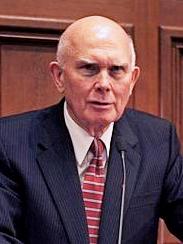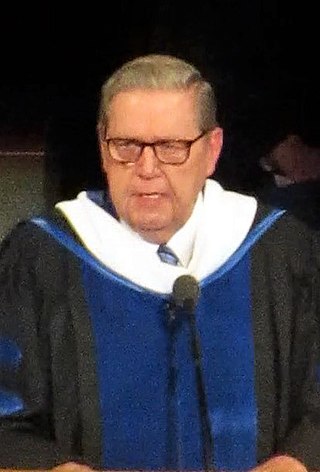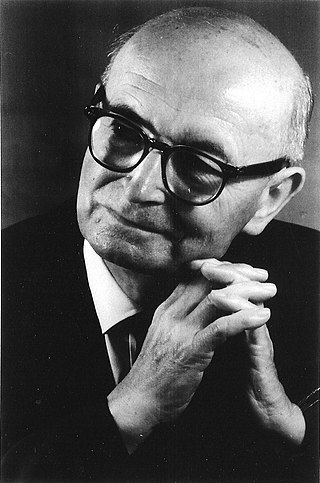
In Islam, the ulama, also spelled ulema, are scholars of Islamic doctrine and law. They are considered the guardians, transmitters, and interpreters of religious knowledge in Islam.

Dallin Harris Oaks is an American religious leader and former jurist and academic who since 2018 has been the first counselor in the First Presidency of the Church of Jesus Christ of Latter-day Saints. He was called as a member of the church's Quorum of the Twelve Apostles in 1984. Currently, he is the second most senior apostle by years of service and is the President of the Quorum of the Twelve Apostles.

The Brigham Young University Jerusalem Center for Near Eastern Studies, situated on Mount of Olives in East Jerusalem, is a satellite campus of Brigham Young University (BYU), the largest religious university in the United States. Owned by the Church of Jesus Christ of Latter-day Saints, the center provides a curriculum that focuses on Old and New Testament, ancient and modern Near Eastern studies, and language. Classroom study is built around field trips that cover the Holy Land, and the program is open to qualifying full-time undergraduate students at either BYU, BYU-Idaho, or BYU-Hawaii.

Jeffrey Roy Holland is an American educator and religious leader. He served as the ninth President of Brigham Young University (BYU) and is the acting president of the Quorum of the Twelve Apostles of the Church of Jesus Christ of Latter-day Saints. As a member of the Quorum of the Twelve, Holland is accepted by the church as a prophet, seer, and revelator. Currently, he is the third most senior apostle in the church.

Sir Hamilton Alexander Rosskeen Gibb, known as H. A. R. Gibb, was a Scottish historian and Orientalist.

Shelomo Dov Goitein was a German-Jewish ethnographer, historian and Arabist known for his research on Jewish life in the Islamic Middle Ages, and particularly on the Cairo Geniza.
The Nahda, also referred to as the Arab Awakening or Enlightenment, was a cultural movement that flourished in Arab-populated regions of the Ottoman Empire, notably in Egypt, Lebanon, Syria, and Tunisia, during the second half of the 19th century and the early 20th century.

Daniel Carl Peterson is a former professor of Islamic Studies and Arabic in the Department of Asian and Near Eastern Languages at Brigham Young University (BYU).
John Woodland "Jack" Welch is a scholar of law and religion. Welch is a member of the Church of Jesus Christ of Latter-day Saints and currently teaches at the J. Reuben Clark Law School (JRCLS) at Brigham Young University (BYU) in Provo, Utah, where he is the Robert K. Thomas University Professor of Law. He is notable for his contributions to LDS (Mormon) scholarship, including his discovery of the ancient literary form chiasmus in the Book of Mormon.
Richard Olsen Cowan is a historian of the Church of Jesus Christ of Latter-day Saints and a former professor in the Church History Department of Brigham Young University (BYU). He was one of the longest-serving BYU faculty and the longest-serving member of the Church History Department ever.
Donald Quayle Cannon is a retired professor at Brigham Young University who specializes in Latter-day Saint history, particularly early Latter-day Saint history and international Latter-day Saint history.
James Albert Toronto was a professor of Arabic language and Islamic religion at Brigham Young University (BYU). He was previously a professor of comparative religion at the same institution. Currently, he serves as the president of the Rome Italy Temple.
Arnold Kent Garr was the chair of the department of Church History and Doctrine at Brigham Young University (BYU) from 2006 to 2009. He was also the lead editor of the Encyclopedia of Latter-day Saint History.

The history of Tunisia under French rule started in 1881 with the establishment of the French protectorate and ended in 1956 with Tunisian independence. The French presence in Tunisia came five decades after their occupation of neighboring Algeria. Both of these lands had been associated with the Ottoman Empire for three centuries, yet each had long since attained political autonomy. Before the French arrived, the Bey of Tunisia had begun a process of modern reforms, but financial difficulties mounted, resulting in debt. A commission of European creditors then took over the finances. After the French conquest of Tunisia the French government assumed Tunisia's international obligations. Major developments and improvements were undertaken by the French in several areas, including transport and infrastructure, industry, the financial system, public health, administration, and education. Although these developments were welcome, nonetheless French businesses and citizens were clearly being favored over Tunisians. Their ancient national sense was early expressed in speech and in print; political organization followed. The independence movement was already active before World War I, and continued to gain strength against mixed French opposition. Its ultimate aim was achieved in 1956.
Elwin Dale LeBaron was a Canadian scholar of the Latter Day Saint movement and a professor of Church History and Doctrine at Brigham Young University (BYU). He is known for his work on the history of the Church of Jesus Christ of Latter-day Saints in Africa, where he served as mission president when the 1978 Revelation on Priesthood was announced and compiled hundreds of interviews from African locals.
The Religious Studies Center (RSC) at Brigham Young University (BYU) sponsors and publishes scholarship on the culture, history, scripture, and doctrine of the Church of Jesus Christ of Latter-day Saints.
Mahmud Qabadu (1812–1872) of Tunisia, also Muhammad Qabadu, was a scholar of Quranic studies, a progressive member of the ulama, a long-time professor at the Zaytuna mosque academy, and a poet. Shaykh Mahmūd Qabādū served as a qadi to the chief judge and latter as mufti in Tunis.
Donna Lee Bowen is an American political scientist who specializes in studies of family policy in the Middle East. She is a professor of political science at Brigham Young University (BYU) where she is also an affiliated faculty member of the Women's Studies Program.
Reid Larkin Neilson is the assistant academic vice president (AAVP) for religious scholarly publications at Brigham Young University (BYU). He was the Assistant Church Historian and Recorder for the Church of Jesus Christ of Latter-day Saints from 2015 to 2019, and the managing director of the church's history department from 2010 to 2019.

Béchir Sfar, , was a Tunisian nationalist campaigner and politician.






